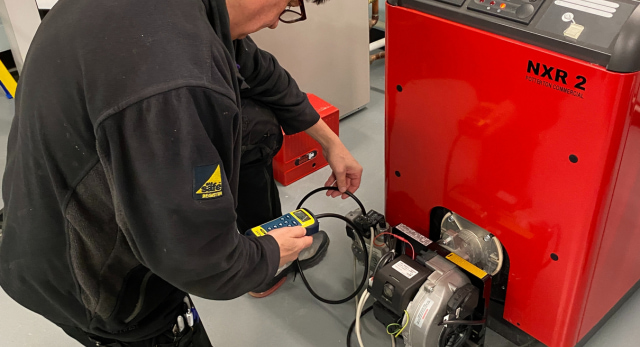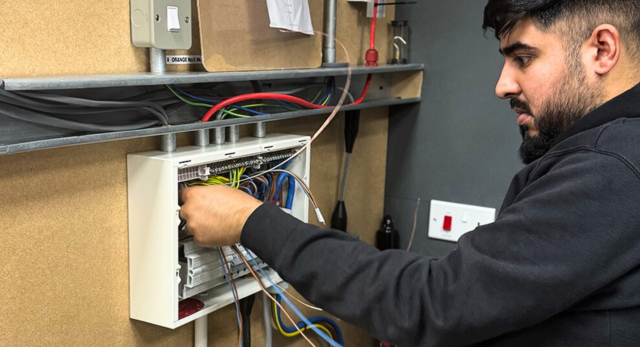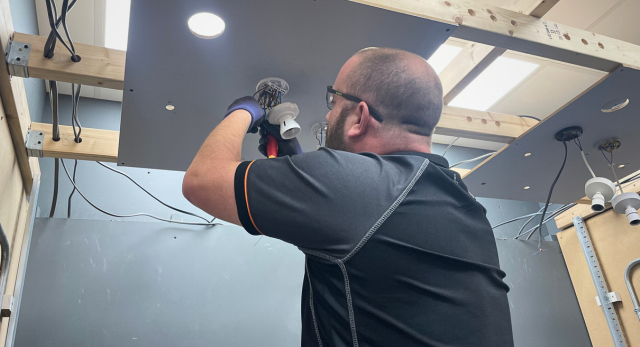A commercial gas engineer is a legally qualified professional authorised to work on high-output gas systems (typically above 70kW) in non-domestic settings like hospitals, schools, and factories. Unlike domestic engineers, they hold specific ACS qualifications such as COCN1 and ICPN1, enabling them to work with complex systems, commercial catering equipment, and industrial pipework.
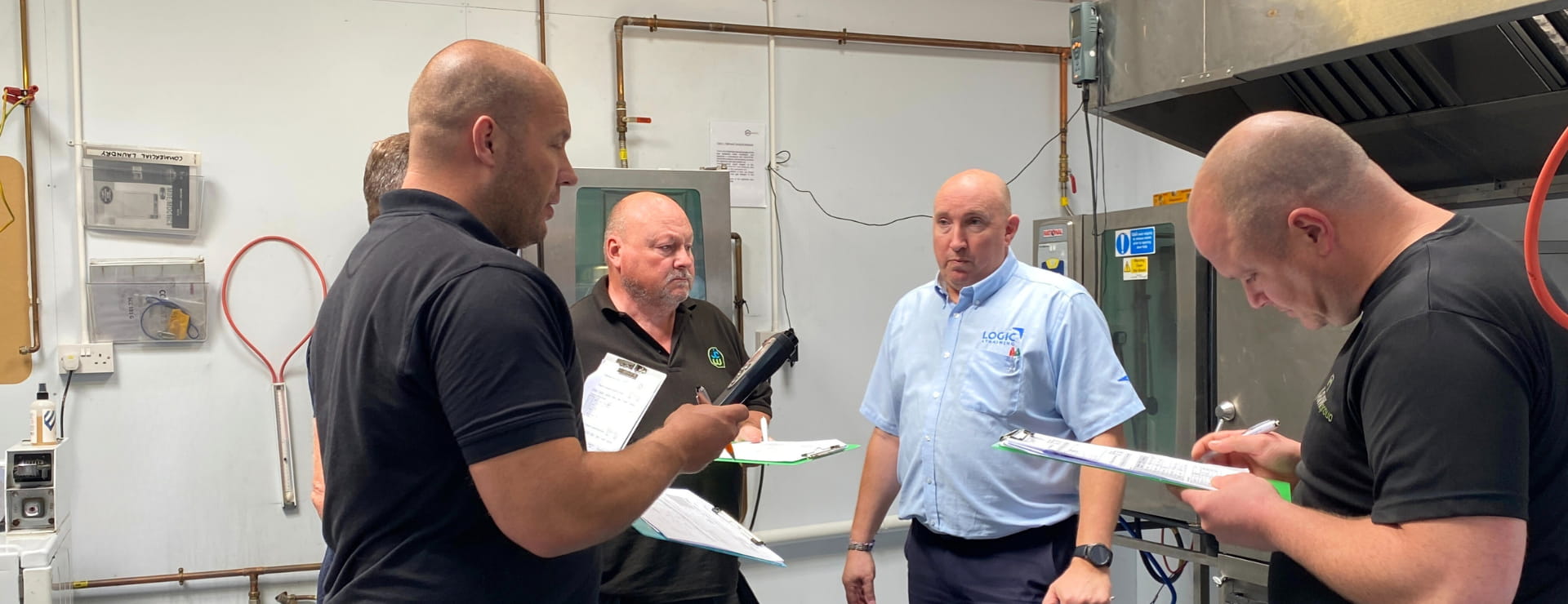
What Type of Work Do Commercial Gas Engineers Do?
Unlike domestic gas engineers, who work on homes and small-scale appliances, commercial gas engineers tackle much larger, more complex systems. This means more responsibility, greater variety, and, yes, a higher earning potential. Whether you’re keeping a hospital warm or a restaurant kitchen firing on all cylinders, commercial gas engineers are vital for the safety and efficiency of businesses across the UK.
These engineers are certified to work on high-output appliances (over 70kW) and larger pipework (over 35mm), which you’ll find in places like shopping centres, industrial kitchens, and big public buildings. They both will carry out the following jobs:
- Installation
- Maintenance
- Repairs
- Emergency Call-Outs
- System Upgrades
- Compliance Checks
But here’s how they differ.
Commercial Heating Gas Engineer
Commercial gas heating engineers focus on large-scale heating systems, commercial boilers, and plant rooms and generally work on:
- Indirect-fired gas appliances
- Direct-fired gas appliances
- Radiant tube and plaque heaters
- Gas-fueled engines
- Commercial gas boosters
- Commercial gas burners
Commercial Catering Gas Engineer
On the other side of the commercial gas sector, commercial gas catering engineers primarily work in commercial kitchens, working on:
- Deep fat and pressure fryers
- Griddles
- Grills
- Boiler burners
- Open/solid top ranges
- Hot plates
- Bain maries
- Forced-draught burner appliances such as ovens and fryers
What Industries Need Commercial Gas Engineers?
You might be surprised by just how many sectors rely on commercial gas engineers. There are:
- Education: Schools, colleges, and universities need safe, reliable heating and hot water.
- Healthcare: Hospitals and care homes depend on complex gas systems for heating, sterilisation, and catering.
- Hospitality: Hotels, restaurants, and pubs all run on commercial gas appliances, especially in their kitchens.
- Retail: Shopping centres and supermarkets require large-scale heating and sometimes specialist gas installations.
- Manufacturing: Factories and warehouses often use gas for heating, process equipment, or even power generation.
- Public Sector: Libraries, council buildings, and leisure centres all need regular attention from commercial gas engineers.
Over the years, we have trained engineers across the sectors, and it has been interesting to hear how these sectors have developed, but basically, if it’s a building that isn’t a house, there’s a good chance a commercial gas engineer has been involved somewhere along the line.
What is the Difference Between Domestic and Commercial Gas Engineers?
This is where things get interesting. While both roles involve working with gas, the scale, complexity, and regulations are worlds apart.
| Feature | Domestic Gas Engineer | Commercial Gas Engineer |
|---|---|---|
| Work Environment | Homes, flats, small residential properties | Offices, schools, hospitals, and factories |
| Appliance Size | Up to 70kW | Over 70kW |
| Pipework Size | Up to 35mm | Over 35mm |
| Training | Domestic ACS qualifications | Commercial ACS qualifications |
| Regulations | Domestic Gas Safety standards | Stricter, more complex commercial standards |
| Job Variety | Boilers, cookers, fires | Plant rooms, industrial kitchens, HVAC, etc. |
Domestic engineers are limited to smaller, less complex systems. Commercial gas engineers, on the other hand, can work across both domestic and commercial settings (once qualified), making them more versatile and in higher demand.
What Commercial Qualifications Are There?
To work as a commercial gas engineer in the UK, you must hold the correct ACS (Accredited Certification Scheme) qualifications for the specific appliances and systems you intend to work on. These are legally mandated under the Gas Safety (Installation and Use) Regulations 1998.
Commercial work is distinct from domestic gas because it involves higher pressures (above 75 mbar), larger pipe diameters (exceeding 35mm), and higher heat outputs (typically above 70kW). Qualifications are broken down into Core elements and Appliance-specific modules across three main sub-sectors:
- Heating
- Catering
- Laundry
Below is a comprehensive list of the qualifications and their codes that we offer at Logic4training.
| ACS Code | Description | Module Type | Details |
|---|---|---|---|
| COCN1 | Core Commercial Heating Gas Safety | Heating | The primary core qualification is for those with no domestic experience and who don’t hold a CCN1. |
| CODNCO1 | Changeover (Domestic to Commercial) | Heating | For engineers holding a valid CCN1 (Domestic), looking to enter the commercial sector. |
| ICPN1 | Installation of Commercial Pipework | Heating | Legally required for “first fix” pipework with a diameter exceeding 35mm. |
| CIGA1 | Indirect Fired Heating Appliances | Heating | Covers installation and maintenance of large commercial boilers (indirect heating). |
| CDGA1 | Direct-Fired Heating Appliances | Heating | Specific to equipment like air heaters, where combustion products are discharged into the heated area. |
| CORT1 | Overhead Radiant Tube & Plaque Heaters | Heating | Specialised for large-scale space heating found in warehouses or retail units. |
| TPCP1 | Tightness Testing & Purging (Large) | Heating | Required for testing pipework volumes exceeding 1m³. |
| TPCP1A | Tightness Testing & Purging (Small) | Heating | Required for testing pipework volumes not exceeding 1m³. |
| CCCN1 | Core Commercial Catering Safety | Catering | The “Core” safety qualification for the non-domestic catering sector. |
| COCATA1 | Changeover to Catering Appliances | Catering | Designed for domestic engineers to expand into commercial kitchen equipment (COMCAT 1 & 3). |
| COMCAT1 | Catering Appliances – Group 1 | Catering | Includes boiling burners, open and solid top ranges, hot plates, and bain-maries. |
| COMCAT2 | Catering Appliances – Group 2 | Catering | Covers water boilers (pressure type), pressure steamers, and pressurised steaming ovens. |
| COMCAT3 | Catering Appliances – Group 3 | Catering | Covers deep fat fryers, pressure fryers, griddles, and grills. |
| COMCAT5 | Catering Forced Draught Burners | Catering | For equipment using forced draught burners, often found in high-capacity ovens. |
| CMC1 | Commercial Mobile Catering (LPG) | Catering | Mandatory for gas work on LPG appliances in mobile catering vehicles and trailers. |
| CCLNG1 | Core Commercial Laundry Safety | Laundry | The core safety module for laundry facilities in hospitals, hotels, and schools. |
| COCCLNG1 | Changeover Commercial to Laundry | Laundry | For existing commercial heating engineers moving into laundry equipment maintenance. |
ACS qualifications are valid for 5 years, after which engineers must undergo reassessment to ensure continuous Gas Safe Register compliance.
Why Would an Engineer Want to Complete Their Commercial Gas Qualifications?
If you’re already working in the domestic gas sector, upskilling into commercial gas could be a big step for your career. At Logic4training, we’ve helped thousands of engineers make this transition successfully, and the benefits are clear. Whether your interest lies in commercial heating systems or high-performance catering equipment, the right qualifications can open doors to a wider, more lucrative, and future-proof career path.
1. Unlock Broader Job Opportunities
Once you’re qualified for commercial gas work, the types of sites you can work on expand significantly. From large retail units and warehouses to schools, hospitals, and hotel kitchens, the variety is far greater than what you’ll typically find in domestic work.
Engineers we’ve trained often tell us how this variety not only makes their day-to-day work more interesting but also increases their confidence and technical ability. Being able to take on complex systems across different environments makes you more employable and more in demand. Additionally, having both heating and catering commercial gas qualifications gives you a competitive edge.
2. Increased Earning Potential
Commercial work typically pays more. The systems are more complex, the responsibilities are greater, and the skill set required is broader. That’s why commercial gas engineers can command day rates and salaries well above the domestic average.
At Logic4training, we’ve supported engineers who have gone on to work on major commercial contracts or started their own businesses – all reporting a significant increase in earnings once they added commercial qualifications to their skillset.
3. Future-Proof Your Skills
With the push toward more energy-efficient systems and the transition to net-zero, engineers with commercial expertise are in a strong position. While renewables are on the rise, gas remains a key part of the UK’s heating and catering infrastructure, particularly in the commercial sector. By training in commercial gas now, you’re positioning yourself for long-term success. You’ll be ready to support essential services like education, healthcare, and hospitality as and when they need work.
How Much Does a Commercial Gas Engineer Earn?
Let’s talk numbers. Commercial gas engineers can expect to earn:
- Starting Salary: £35,000-£40,000 per year
- Experienced Engineers: £45,000-£55,000+
- Specialist/Senior Roles: £60,000+ (especially in London and the South East)
- Self-Employed/Contractors: Day rates can exceed £250-£350, depending on the job and location
Your earning potential increases with experience, additional qualifications, and the ability to take on more complex or high-risk work. Many commercial gas engineers also move into consultancy, management, or even start their own businesses.
Are Gas Engineers Still in High Demand?
In a word: Absolutely. The UK is facing a well-documented shortage of skilled tradespeople, including gas engineers, and the commercial sector is feeling the pinch. Here’s why:
- Ageing Workforce: Many experienced engineers are retiring, leaving a skills gap.
- Rising Demand: New builds, refurbishments, and ongoing maintenance mean there’s always work to be done.
- Net-Zero Transition: Even as we move towards renewables, gas engineers are needed to maintain existing infrastructure and help with the transition to greener technologies.
- Commercial Reliance: Businesses can’t afford downtime, so they need reliable, qualified engineers on call.
Recent data shows gas engineers are among the top five most-advertised roles in UK construction, with tens of thousands of vacancies. For anyone considering a career as a commercial gas engineer, the future looks bright.
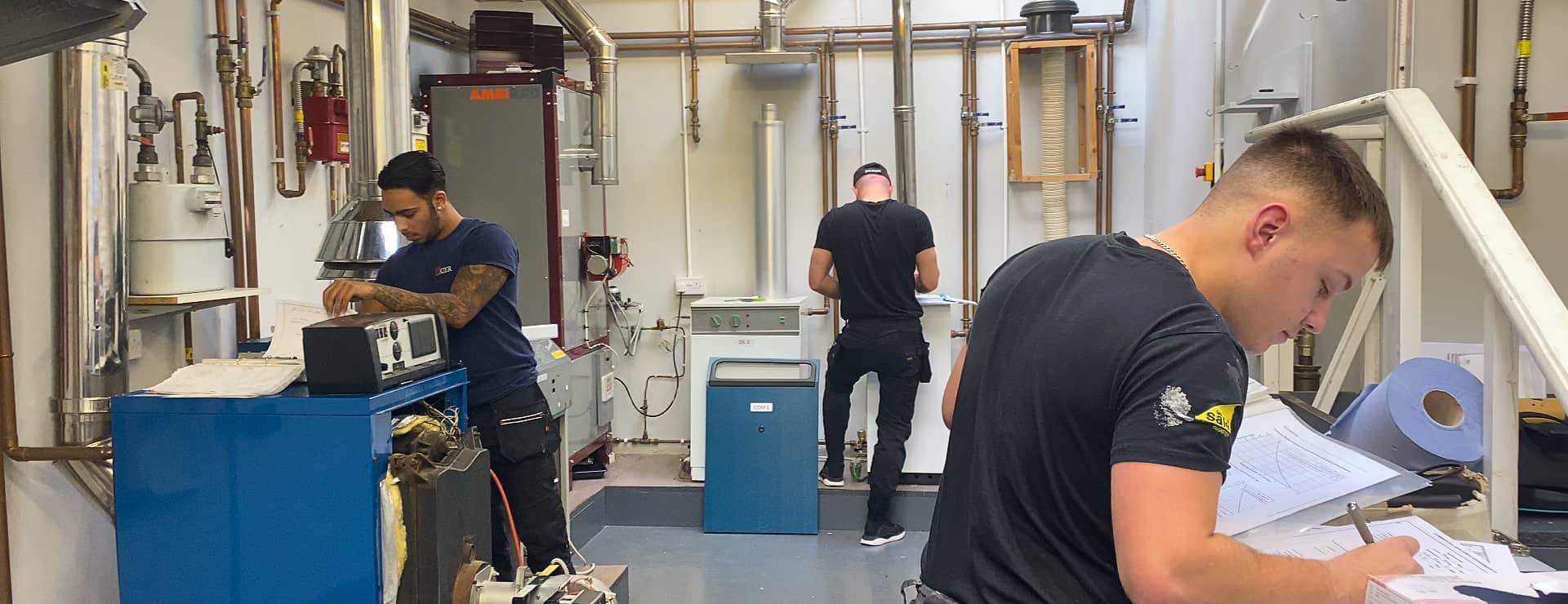
How to Become a Commercial Gas Engineer
There are two distinct pathways to becoming a commercial gas engineer: Heating and Catering. Each route requires its own specialist training and qualifications, reflecting the different systems, regulations, and safety standards you’ll encounter in the field.
Commercial Heating Pathway
If you want to work on commercial heating systems, such as boilers, plant rooms, and large-scale heating equipment in offices, schools, hospitals, and industrial sites, you’ll need to follow the commercial heating route. Below you can find the different routes you can take to become a qualified commercial heating gas engineer:
- New Entrants: For those new to the industry, the best starting point is a New Entrant Commercial Heating Training Course (Managed Learning Programme). This course covers everything from gas safety regulations and commercial pipework to commissioning, servicing, and repairing commercial boilers and warm air heaters. It also includes essential health and safety modules. After completing the training and building your on-site portfolio, you’ll move on to the core ACS assessments, such as COCN1 (Core Commercial Gas Safety), ICPN1 (Commercial Pipework), and CIGA1 (Indirect Fired Heating Appliances). Passing these assessments allows you to register with Gas Safe and work legally in the commercial heating sector.
- Already a domestic gas engineer: If you’re already qualified in domestic gas and have held your CCN1 for at least 12 months, you can take a commercial heating upskill course. This 8 day course provides all the necessary practical and theoretical training to help you complete the following modules:
- CODNCO1 Changeover Domestic to Commercial
- ICPN1 Installation First Fix on Commercial Pipework
- CIGA1 Indirect-Fired Commercial Appliances
- CORT1 Radiant Tube & Radiant Plaque Heaters
Please note: if you are looking to test and commission commercial gas pipework installations, you may also need to undertake TPCP1 Testing & Purging (>1m³ in Volume and/or TPCP1A Testing & Purging (<1m³ in Volume) module.
Commercial Catering Pathway
For those interested in working in commercial kitchens, installing, servicing, and repairing appliances like ovens, grills, fryers, and specialist catering equipment, the commercial catering pathway is the way to go.
- New Entrants: A New Entrant Commercial Catering Gas Training Course provides in-depth training on gas safety, catering appliance controls, kitchen ventilation, and commissioning and servicing a range of catering appliances. Like the heating pathway, you’ll complete a portfolio of real-world work before progressing to ACS assessments such as CCCN1 (Core Commercial Catering Gas Safety), COMCAT1 (boiler burner, open/solid top ranges, hot plates and bain maries), and COMCAT3 (deep fat and pressure fryers, griddles and grills). Successful candidates can then apply to join the Gas Safe Register and work legally in commercial catering environments.
- Already a domestic gas engineer: If you’re already qualified in domestic gas and have held your CCN1 for at least 12 months, you can take a catering changeover course. This 8 day course provides all the necessary practical and theoretical training to help you complete the following modules:
- CODC1 Changeover Domestic to Commercial Catering Core
- COCATA1 Changeover Domestic to Commercial Catering Appliances
- COMCAT1 (boiler burner, open/solid top ranges, hot plates and bain maries)
- COMCAT3 (deep fat and pressure fryers, griddles and grills)
- CORT1 Radiant Tube & Radiant Plaque Heaters
If required, COMCAT5 – Catering Forced Draught Burners can be added to this package for an additional £165.00 + VAT.
Please note: Like the commercial heating route, if you are looking to test and commission commercial gas pipework installations, you may also need to undertake TPCP1 Testing & Purging (>1m³ in Volume and/or TPCP1A Testing & Purging (<1m³ in Volume) module.
Key Steps for Both Pathways:
- Get Qualified: Complete a recognised commercial heating or catering training programme (MLP for new entrants, changeover for domestic engineers).
- Gain Experience: Build a portfolio of supervised, on-site commercial work.
- Pass ACS Assessments: Take and pass the relevant ACS modules for your pathway (heating or catering).
- Register with Gas Safe: Once qualified, register with the Gas Safe Register to work legally.
- Keep Learning: Stay up to date with industry changes and regulations through regular CPD and upskilling.
Commercial Reassessment Courses
All commercial gas qualifications in the UK have to be renewed every 5 years. For engineers who need to renew or reassess their commercial gas qualifications, Logic4training offers a range of dedicated packages:
- Heating (commercial only): For engineers who work solely in the commercial sector and need to renew their commercial heating ACS qualification.
- Heating (commercial and want to keep their domestic live): Ideal for those who want to keep both commercial and domestic qualifications active.
- Catering: For those needing to renew their commercial catering gas qualification.
Commercial Upskill Modules
If you’re looking to expand your expertise or add new specialisms, Logic4training offers a range of upskill modules:
- Heating: Specialist modules for commercial heating appliances and systems.
- Catering: Modules covering a variety of commercial catering appliances and environments.
- Commercial Laundry: For those wanting to branch out into commercial laundry gas systems.
To keep individual module qualifications live, you will need to retake the individual training courses to prove competency. These courses are designed to build on your existing skills and prepare you for the relevant ACS assessments in your chosen commercial sector.
Why Train with Logic4training?
Choosing a training provider can be difficult, especially if you don’t know where to start. Ideally, you want to be learning with a training provider that is respected by the Gas Safe Register and regulatory bodies across the UK. At Logic4training, we:
- Have 23+ Years of Industry Leadership: Founded in 2002 (originally as Gas Logic), Logic4training has evolved into the UK’s leading building services training provider. With over 23 years of experience and more than 65,000 successful graduates, we have a proven track record of helping engineers transition from new entrants to industry-leading specialists.
- Expert-Led Training & State-of-the-Art Facilities: Our trainers aren’t just educators; they are seasoned professionals with extensive field experience in commercial heating, plumbing, and electrical engineering. Training is delivered across our four high-spec centers in Northolt, Basildon, Luton, and Sittingbourne, which feature realistic “plant room” environments to simulate true commercial settings.
- Accredited Excellence: We are a fully approved LCL Awards center, ensuring our ACS assessments meet the highest national standards for safety and technical accuracy. Our curriculum is strictly aligned with the IGEM/IG/1 Standards of Training, which is the gold standard for anyone looking to enter or advance within the gas industry.
- Trusted by the UK’s Biggest Brands: We have successfully trained engineers for the NHS, EDF, E.ON, CBRE, and Tesco, among many others. When you train with us, you are receiving the same level of instruction trusted by the country’s largest employers.
We maintain a 4.9-star rating on Trustpilot and Google Reviews with over 2,300 reviews across our centres, a testament to our commitment to student success and career support. Our mission is to ensure you leave our centres not just with a certificate, but with the competence to excel in the field. By combining our expertise with your ambition, you can begin a journey that transforms your career prospects in the commercial gas industry.
Conclusion
Stepping into the world of commercial gas engineering is a strategic career move that offers technical variety, high demand, and significant earning potential. Whether you specialise in the complexity of large-scale heating systems or the fast-paced requirements of commercial catering, the sector provides a stable, future-proof professional path.
For domestic installers, the transition via a commercial gas changeover course (CODNCO1) is the most efficient route to expanding your license. For new entrants, the journey begins with a Managed Learning Programme (MLP), building the foundational competency required for the Gas Safe Register.
Key Takeaways
- Specific Pathways: Choose between Heating, Catering, or Laundry modules based on your target market.
- Regulatory Compliance: All work must align with the Gas Safety (Installation and Use) Regulations 1998 and be backed by valid ACS qualifications.
- Professional Growth: Commercial engineers typically command higher day rates and have access to large-scale contracts in schools, hospitals, and industrial plants.
At Logic4training, we provide certificates, with expert-led training in our state-of-the-art centres, and we support you from your initial ACS assessments through to five-year reassessments. As the UK energy landscape evolves toward more efficient systems, there has never been a better time to upskill and secure your place in the industry.
Retrain as a gas engineer in 2026
FAQs
What defines a “Commercial” gas installation in the UK?
Under UK safety standards, an installation is generally classified as commercial if the individual appliance heat output exceeds 70kW or if the gas pipework diameter is greater than 35mm. Furthermore, any gas work carried out in non-domestic settings—such as schools, hospitals, or factories—requires a commercial gas engineer holding valid ACS qualifications (e.g., COCN1).
What is the difference between a domestic and commercial gas engineer?
The primary difference lies in the legal scope of work. A domestic engineer is qualified for residential systems up to 70kW. A commercial gas engineer is qualified to work on high-output plant rooms, industrial heating, and commercial catering equipment. Because commercial engineers often hold both domestic and commercial tickets, they have a wider professional remit and significantly higher earning potential, with senior salaries often exceeding £60,000.
How do I switch from domestic to commercial gas engineering?
If you have held your CCN1 (Domestic Gas Safety) for at least 12 months, the most efficient route is a Commercial Changeover Course (CODNCO1). This upskill program typically takes 8 days and covers the fundamental differences in commercial pressures (above 75 mbar) and pipework. Once completed, you can add specific modules like CIGA1 (Indirect Heating) or COMCAT (Catering) to your Gas Safe license.
What are the mandatory ACS codes for commercial catering?
To work legally in a commercial kitchen, you must hold CCCN1 (Core Commercial Catering Safety) or the changeover equivalent, COCATA1. From there, you add appliance-specific modules:
- COMCAT1: Ranges, boilers, and bain-maries.
- COMCAT3: Deep fat fryers and griddles.
- CMC1: Mandatory for Mobile Catering (LPG) such as food trucks and trailers.
How often do commercial gas qualifications need to be renewed?
In accordance with the Gas Safety (Installation and Use) Regulations 1998, all ACS qualifications expire every 5 years. Engineers must undergo a Commercial Reassessment to prove continued competence and maintain their status on the Gas Safe Register. Logic4training recommends booking reassessment up to six months before expiry to ensure there is no lapse in your legal right to work.
What are the requirements for testing commercial gas pipework?
Testing and commissioning commercial pipework is governed by volume. If you are working on systems where the pipework volume exceeds 1m³, you must hold the TPCP1 (Tightness Testing and Purging) qualification. For volumes not exceeding 1m³, the TPCP1A module is required.
